
Highlights | Calendar | Music | Books | Concerts | Links | Education | Health
What's New | LaRouche | Spanish Pages | Poetry | Maps
Dialogue of Cultures
SCHILLER INSTITUTE CONFERENCE
Panel V
The LaRouche International
Youth Movement:
The Key to Victory
'Hoover II' Has Happened!
The Global Financial Crash of 2002
Labor Day Weekend
August 31- September 1, 2002
(Scroll down or click for Links to Entire Proceedings)
Before Panel V began, during the dinner break on Sunday, September 1, a special meeting was held with Lyndon and Helga LaRouche and Youth Movement leaders, chaired by Phil Rubenstein (left) and Harley Schlanger (right), who also moderated (the public) PANEL V.
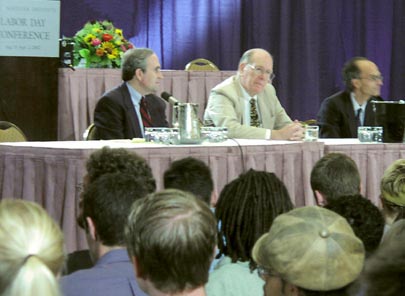
There is no audio available for this Special Session, but you can read the full report on this and other dialogues with Mr. LaRouche in the Summer 2002 FIDELIO Magazine (Release date- Fall 2002).
Panel V, The LaRouche International Youth Movement, was opened with a moving tribute to recently deceased William Warfield, which included brief remarks by Dennis Speed, followed by video clips of Bill Warfield's performances. It is not possible to replicate this is writing. Scroll down or click to Link to the Audio at the bottom of the page.
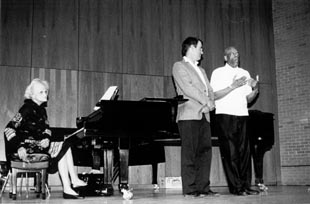 |
|
The next section of the panel was opened by two national leaders of the LaRouche movement, Harley Schlanger and Phil Rubenstein, who discussed the work of organizing the LaRouche Youth Movement. This process began on the West Coast a few years ago, and with the power of truth and great ideas, and Lyndon LaRouche's leadership, the movement has blossomed.
They introduced the young members of that movement, who stepped up to the podium to give their views of what their movement represents. Included here are excerpts of the remarks of only 14 of the 20 young people who spoke. A film clip of the Youth Movement's lively rally was shown, which had been held right after the West Coast Cadre School in August, as they marched with a bullhorn from the Federal Reserve to the LA Times. See the accompanying article, (below), also.
The following transcript represents only a portion of the discussion which took place during the final panel of the ICLC/Schiller Institute conference over the Labor Day weekend, Aug. 31-Sept. 1, 2002.
The full transcript of the presentations will be posted in the near future:
PANEL V
Youth Leaders' Presentations:
Myhoa Steger:
I spent 21 years of my life dedicated to Classical piano. And, having found the LaRouche movement, it made it quite an easy decision to go with it. You don't go back from that. But, the truth was kept from me for 21 years: the beauty of Beethoven and Bach was intentionally kept from me....
I've been organizing for the past three months as a full-time field organizer in Chicago. And organizing to me is the same as Classical composition, Classical art, dialogue. You do it to uplift the minds and spirits of human beings. And, as my husband said, without the moral commitment, it's impossible to do anything, without this moral commitment to humankind, and love for humankind.
Jonathan DeFranco:
I represent the younger part of this youth movement, called the "Whynots?"
...What you need is actually a love for mankind, a willingness to give your life for another human being, whoever that may be. Like for instance, in Beethoven's Fidelio, his opera Fidelio, where the lady Leonora decides to save this prisoner, whoever it is. She went there first with the purpose to save her husband, so she went down to the dungeon, and she doesn't know who it is. But she decided, whoever it is, I'm going to save this human being, because he has a mind. And because any boy that has been starving in Africa, has been mistreated by Henry Kissinger and other parts of the oligarchy, has the same potential as Leonardo da Vinci.
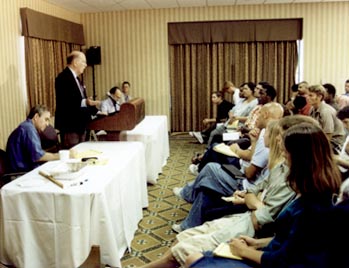 |
||||
|
LaRouche in dialogue with young people at the August 2002 Cadre School in Southern California
|
||||
But I think that the essense of the youth movement is the attention, the focus, on the biggest, deepest ideas that have ever existed in the universe.
Quincy O'Neill: I'm part of the Los Angeles field. I've been in the organization for about a year now. And, well, you run into Lyndon LaRouche, and it's phenomenal. You can't believe it. It's just incredible. But then, after that part of it: If what he is saying is true, then what is that going to require of me? I mean, if we can really do it, then, what does that mean? That's the more difficult question.
But, what I've gotten a sense of, in what we've been doing in Los Angeles, is that, it's ours for the taking, as Lyn has said to us the whole time. This fall, the campuses are going to get taken over. It's ours! And as that becomes clearer, you can't contain the excitement.... It's really our time. And if you can get a sense of that, a whiff of that, then the fun, and the energy you get from that, well, you'll communicate that, and we will take the country back.
Delonte Bass: I'm organizing in Baltimore.... I'm looking around the room, and I'm just looking, and saying, "This is absolutely remarkable!" All these people here, that have this sense that they want to change the world. Especially the youth.
My friend asked me, what if everybody was thinking Classical at this point? Where would we be in this world right now? And I was telling him, "Well, we'd probably be skipping on different planets or something!" Or, "I'll be talking to Harley and Phil while they're on Saturn, or something." And the project will be called "Planet-Bridge"....
At times I get impatient, 'cause I want it now and at this point. But we can't have it now. We've got to work hard, and it's going to take time. We can get there. We will get there. So just keep fighting. I encourage everybody to study these profound thinkers, and let's change this world.
Elodie Viennot: So, I just got here from France. I met LaRouche in Los Angeles, on my campus, when I came here. It's just like I moved to the United States to meet LaRouche, basically. And then I went back. Now, the thing that I think is the most important to say is, at first I thought I was fighting for LaRouche's ideas, period. And then I realized that LaRouche's ideas are the Universe's ideas.
Now, I was going to school, and obviously, there was nothing like this going on there! So, gradually, I had to come to the conclusion: There's no way I'm going back there, to those classrooms, where it's full of dust in the minds of those teachers. They're dead. I hope we might one day run into them at a book table, and wake them up. But basically, what I'm seeing right now, is, we have the greatest opportunity we've ever had in all known human history, to get things to move. This is world-historical. Everything is breaking down. There's danger of world huge genocide in just a quick moment, and either it's this, either it's the opposite extreme, or this, or we get, as Helga said, the greatest Renaissance we've ever seen. And I think we can get through this. This is potential geniuses over here, even Baby Boomers! You made it. You made it too!
Elizabeth Nash: The first time I came across the LaRouche table, was at UCLA, and I remember a very tall guy with red hair said, "Your degree is gonna be worth nothing pretty soon!" And I completely ignored him, and I kept walking, just, you know, very primly, and I looked down, and I had these tears rolling down my eyes, because I knew he was telling the truth! And so, after that, I began to have these discussions with people at the office, and the truth is just so liberating, isn't it? Because, you come to realize—Wow!—we're not destroying the world. Wow! Humanity actually has a role in the universe. And it's such a liberating feeling. It's so exciting.
And, what's even more exciting is the idea that the people who founded this nation actually had a conception of God and man that was the truth. And they really loved, they loved humanity. They wanted a future; they weren't all racists, lying bigots—isn't that exciting!
...And I think that this is the generation that loves to break the rules. And I think that we should go out and break the rules. I think that we should break this system—it's already breaking.... And I think we should work together, and I think we should go out, and I think we should take this country back! And I think we can do it.
Brian McAndrews: I want to report, what my friend Bill, who's now in Dresden, Germany, conveyed to me last week in a conference call....
And he's doing a lot of student organizing, and having a very profound effect on young students in Germany. And he said to me, what he's telling them is what we're doing here. He said, the young Germans, they think of the United States as George Bush—they think of the cowboy with the six-shooters on his waist. And they hear that there's an intellectual movement in the same vein as the Founding Fathers—that they're carrying on this tradition. And that they're taking this seriously, and taking these ideas of LaRouche up, like the Land-Bridge, like Helga's campaign to rebuild Europe. They become invigorated. And they say, "Well, there's this evil empire, but yet, there's this core in this evil empire, that still represents something good, and it's still fighting against this oligarchy. And we have a chance to win. If these guys can do it in the United States, if they can roll back the oligarchy, if they can roll back the push for fascism, like they already have, then, we can win."
Riana St. Classis: I'm an organizer in Seattle, for about seven months. And, I wanted to tell this organization how grateful I am to have found it.
...And it made me think back to a moment when I was in college, my second year of school, when I called my father up on the phone, and I was crying, and I said, "I don't know what my purpose is, Dad. I can't find it. These teachers are so mean, and all these people are so competitive. I just don't know." And my Dad said, "Well, you see, I thought I had a purpose, and I realized, there aren't any purposes. You just have to get a job. You just try to get along. You know, sometimes you stub your toe, but, you just keep walking." And, to finally find an organization, where they're saying: "You have a purpose." And that's when you really get scared! Because that means you have this huge responsibility. You have to do something.
Sky Shields: We've got a lot of potential. We're well armed as a movement, given what LaRouche has been doing, in terms of science and scientific epistemology. Just because, I can say it from experience: Being on a campus and studying science is Hell....
You get this problem, where you want to figure out: Well, why are we here? Why is space here? And instead of starting where Lyn starts from, with the idea, the question of least action; the question of: What principles about the universe are self-evident, suffice to explain the rest of the universe? That's arbitrarily excluded from the way you can look at the universe....
And we're in a unique position right now, because the position LaRouche put us in, is that we've got the only way to pull people out of that....
And what we can bring to the table, if we're serious about doing what Lyn is saying, about actually figuring out, well, what's the process that gives you the alternative to that? What's the process of human reason that allows you to add something, that makes it so you're not stuck in a closed, entropic system? And if we really master that, from the level that he says to master it, like work with the Gauss, work all the way through Gauss's discovery of the fundamental theorem of algebra.... Because if we can figure out how to master that idea of coming to an ontological paradox, figuring out how do you resolve it, in a creative fashion, and get to something, and actually act to change, act effectively to change the universe, and you can demonstrate that to another human mind, that has a profound effect on people. It demonstrates to them, okay, well, this is how you think and act like a human being, and in a real sense, a fundamental sense, it gets them out of Hell.
Ingrid ———-: I'm an organizer in Monterrey, Mexico. I only have been in the organization for four months, but since I met them, I have to admit that I was not a moral person at all. I was always thinking on—I like economy, but, I like it in a very selfish way. Like if, I'm going to be broke, or something—. But, then I started to realize that I was included in all these crises, and everything. So, I have to thank LaRouche, and also, Socrates, for educating me in a moral way, because I have to admit that I'm a totally different person since four months ago.
Samuel Dixon: I'm from the Los Angeles region.... When I was in 9th grade, as my best friend, who is here tonight, can attest to, I said that, "We should have a cultural revolution in the United States of America." And she said to me, "You're gonna get killed, like Martin Luther King and Malcolm X!" Somehow, in between 9th grade, and when I ran across the LaRouche table, and lied about not having any money, I lost my way, and started thinking about, well, maybe the way you've got to get this cultural revolution thing done, is, you've got to get lots of money. So, I went to Howard, the so-called "Mecca" of black intelligentsia....
Now, what got me to stop thinking about money, and start thinking about the truth, about what was really going on, was, the class [Ted Andromidas] gave: This is what got me to question money, that got me to question everything I thought I knew—and I thought I knew a lot—was the idea of this curve called the brachistrochrome.... The question was: What's the shortest distance between two points? Me, being smart-aleck Sam, said: "A straight line, of course." Ted looked at me with this smile, that, anyone who knows him, is his trademark devilish smile. He said, "Oh, really?" And he dropped the two balls, one on a straight line, and one the curve called the brachistochrome, and the one on the brachistochrome got to the bottom first.
That crushed an axiom. I knew at that point, that I definitely didn't know what I was talking about. And that what was important was, not that I didn't know what I was talking about, but that he saved me from thinking that the shortest distance between two points was a straight line....
And I do want to do something good, as I believe many, and most of the people in our generation actually do want to do: actually create beauty. Now, how do you do that? First, you've got to be truthful, and when you're told you're wrong, you have to say: "Thank you."
Anna Shavin: I grew up in the Labor Committees, and there's people out there that have done the same, there's many more, that are starting to get involved. But growing up inside the Labor Committees is a pretty unique thing. And, I went to college, and what happened was, you just really have to examine the things that you think you know. Because you grow up around LaRouche, and you grow up around Plato, and Classical music, and wonderful ideas, and wonderful people, really, for all the problems that they have.
And, so what it really does take, it's just, you have to find that you're a sovereign being....
When students come around, and their background, their identity gets attacked, or gets questioned, one of real fights is whether or not you say, "Look, okay, maybe there is something wrong with what I do, and I'm willing to search for truth, I'm willing to change it." And that's one of the most important things that we've come across, I think, in the last couple of years, is looking for people who are actually willing to—and, in yourself, being willing to—change the faults that you have to make them better. And recognizing that's not who you are. And the same thing in other people, so that if students come around thinking that they're no different than featherless bipeds, that you can see in them a potential of what they can become.
Cody Jones: I'm Cody Jones. I'm a LaRouchie. I've been sober for three years....(!) (laughter) ...Let's be realistic. The reality is, this financial system is collapsing, and if anything is going to come out of this that's good, it's going to be this movement. So the reality is, at that point, there's going to be a serious demand for LaRouche's economics. LaRouche can only be in one place at one time, so we've actually got to think that big. We've got to be thinking in terms of, okay, I'm going to be called upon to be brought into, whatever, Zaire, Brazil, any country in the world, to actually guide and organize these nations and these leaders to implement LaRouche's economic policies. And I think that's the way people should—people should actually be thinking about it that way.
Click here for the Article and Photos.
Join the Movement!
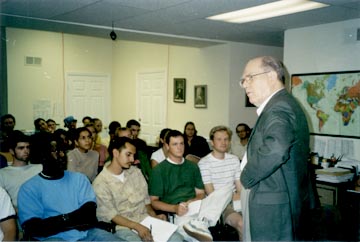
at the Post-Conference Cadre School.
Conference Proceedings
Audio Archive and Transcripts
IMPORTANT!!
Requirements for listening:
In order to listen to the webcast, you will need to have a free piece of software called Windows Media Player. If you don't already have it loaded on your computer, click on their name to go to their website, and download it.
Panel 1:
Introduction: Amelia Boynton Robinson
KEYNOTE PRESENTATION
"The World Will Never Seem the Same"
Lyndon H. LaRouche, Jr., Chairman
ICLC; Founder and Contributing Editor, EIR
ENGLISH: Transcript
Charts and Graphics
Transcript of Discussion
High Speed Internet Connection (Audio-Video)
Low Speed Internet Connection (Audio Only)
SPANISH: Transcript
High Speed Internet Connection (Audio-Video)
Low Speed Internet Connection (Audio)
Panel 2:
INTERNATIONAL ORGANIZING
Ibero-America Turns to LaRouche —Dennis Small
Growing Resistance to the War —Jeffrey Steinberg
Discussion
ENGLISH: Transcript (This page)
High Speed Internet Connection (Audio-Video)
Low Speed Internet Connection (Audio Only)
High Speed Internet Connection (Audio-Video)
Speed Internet Connection (Audio)
Sunday, September 1, 2002
Panel 3:
Musical Introduction: Youth String Quartet
Introduction: Amelia Boynton Robinson
KEYNOTE PRESENTATION II
"Reclaiming the Fututre for Our Youth"
Helga Zepp LaRouche, Founder and Chairman, Schiller Institute
ENGLISH: Transcript
Low Speed Internet Connection (Audio Only)
SPANISH: Transcript
High Speed Internet Connection (Audio-Video)
Low Speed Internet Connection (AudioOnly)
Panel 4:
OPEN DISCUSSION
Dialogue with Lyndon LaRouche
ENGLISH: Transcript
High Speed Internet Connection (Audio-Video)
Low Speed Internet Connection (Audio Only)
Panel 5:
Tribute to William Warfield
Short Video Selections
THE LaROUCHE YOUTH MOVEMENT
Phil Rubinstein
Harley Schlanger
Brief comments from Syliva Olden Lee
ENGLISH: Transcript
Article about this Panel
Low Speed Internet Connection (Audio Only)
To ask a question
to Mr. LaRouche, Mrs. LaRouche or the other speakers,
send your email message to:
schiller@schillerinstitute.org
Join the Movement!
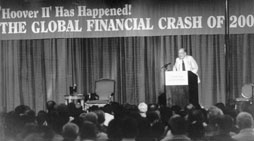
LaRouche Launches Youth Movement To Rebuild America
A revolution has begun inside the United States, led by a rare collection of young people, who, having grasped the nature of the historical period we are living in, have decided to dedicate their lives to ensuring that the world will not descend into a New Dark Age, but rather initiate a new Renaissance. These young Americans—political "canaries in the mine"—have been joining Lyndon LaRouche's campaign in increasing numbers as the collapse has come on during 2002.
LaRouche gathered the leadership of this new international youth movement, at the semi-annual conference of the International Caucus of Labor Committees and Schiller Institute on "The Global Financial Crash of 2002," attended by 1,000, in Reston, Virginia over the Labor Day weekend. On this weekend which traditionally looks forward to November election days, LaRouche's keynote speech also detailed an "emergency November program" to rebuild the transport and economic infrastructure of the United States, which is collapsing in bankruptcy shutdowns. He is "presenting the President and the incoming Congress with the emergency program they must immediately adopt" to stop the disintegration of the U.S. economy; and the youth movement is mobilized with this idea.
Generation With 'No Future'
LaRouche is a world-historic individual in this crisis, as Franklin Delano Roosevelt—whom he cited as a model in his keynote—was such a personality who revived the nation from the last Depression. In giving the youth now joining him, greater freedom and responsibility in his movement, he stressed that the key to acquiring the courage required to lead in a time of crisis, is the sense of personal identity, based on the knowledge that, although life is mortal, one achieves immortality, through doing something "which was needed, in honor of past mankind, and for the sake of the future of mankind."
Over the course of the past generation, the "Baby Boomer" generation of those born after World War II, everything that had been achieved by Roosevelt has been destroyed. The shift from producer to "consumer society," the rock-drug-sex counterculture, and the fixation on "personal needs," as opposed to the the general welfare on which FDR based his Presidency, has made the U.S. economy a global looting machine, now thoroughly breaking down. It has produced a youth whose self-conception is "the no-future generation," to whom no future mission is offered in school, economy, or society. They respond now to LaRouche's message that they have to make their own future by a mission to rebuild America and the world.
Cultural pessimism is pervasive among this generation; they have no sense of truth or mission. Many college-age youth do not even wear watches, as they have no sense of time. The "counterculture" which their parents adopted from the 1960s, and have made the dominant culture of present-day America, has eliminated Classical culture, robbing youth of a sense of history, of science and technological progress.
Their advantage, however, as West Coast LaRouche movement leader Philip Rubinstein pointed out, is that by 1998-99, they knew they had "no future." Whereas their Baby Boomer parents still nurture illusions that they can somehow survive in the stock and real estate markets and have enough money to retire—"or at least to pay for their funeral"—the generation of 18- to 25-year-olds realize the system is gone, and that their education is a fraud, preparing them for nothing they actually face.
When confronted with the moral and intellectual challenge represented by LaRouche, and by his uncanny ability to forecast economic and political developments, they respond with shock and intrigue, and a desire to learn how he was able to do so. For example, LaRouche's warning on Nov. 3, 2000, that the Presidential elections would not be decided on Election Day; and his January 2000 published insistence that the omnipotent Enron, then ripping up California, had to collapse; proved to many youth that LaRouche uniquely "knows what he is talking about."
Some 20-30 of the youth movement's organizers told the story from their own vantage point during the Sept. 1 evening plenary. A young man from Los Angeles who has been organizing for LaRouche since late 2001, recalled his first contact with LaRouche, as "phenomenal, unbelievable," but that he then thought: "If what he is saying is true, what does that require of me?" A college girl whose father had told her that life was without purpose, related her awareness during her first attendance at a Schiller Institute cadre school, that it was a "profound moment.... Finally I found people who would discuss philosophy, who were doing something." Others emphasized their sense of the enormous responsibility they had taken on, by joining LaRouche's movement at such a time of breakdown crisis.
Several said they had thought at first, that it would be "easy" to recruit their friends and contemporaries to the movement, but soon found otherwise. A student leader from California reported his confrontation with other students during a demonstration, who were deriding the speakers with the deep pessimism common to so many students, saying, "The fool is the one who thinks he can do something to change the world." But this young leader emphasized to the conference, "Think big. Maybe I'll be called upon to go to Congo-Zaire, or to Brazil, to help implement LaRouche's policies.
That's what this youth movement is for: to implement the new monetary system, and avoid a Dark Age." Its national purpose, of course: LaRouche in the White House in 2004, and save the soul of the USA.
schiller@schillerinstitute.org
The Schiller Institute
PO BOX 20244
Washington, DC 20041-0244
703-297-8368
Thank you for supporting the Schiller Institute. Your membership and contributions enable us to publish FIDELIO Magazine, and to sponsor concerts, conferences, and other activities which represent critical interventions into the policy making and cultural life of the nation and the world.
Contributions and memberships are not tax-deductible.
Join the Movement!
VISIT THESE OTHER PAGES:
Home | Search | About | Fidelio | Economy | Strategy | Justice | Conferences | Join
Highlights | Calendar | Music | Books | Concerts | Links | Education | Health
What's New | LaRouche | Spanish Pages | Poetry | Maps
Dialogue of Cultures
© Copyright Schiller Institute, Inc. 2002. All Rights Reserved.